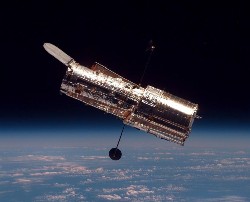What popular Internet program boasts over 100 million downloads yet its name is unfamiliar to most Americans? That would be
Skype, an Internet telephony service based in Europe that is enjoying phenomenal popularity "across the pond" (and in Asia as well). Owing as to how a similar service has only just come to the States--New Jersey-based
Vonage--and how "VoIP" (Voice Over IP) is only just starting to become a familiar acronym, I hope I am excused for only just getting to know what it's all about.
This week, I decided to give it a try for myself. I downloaded the Skype program, which allows anyone with a microphone and speakers/headphones to use their computer as a phone to call, for free, any other Skype user in the entire world. The program is remarkably easy to use, and it works very well. The quality of the connection, even on international calls, is quite good.
One thing I've enjoyed about Skype is the ease by which users from all over the world can search for other people with whom to have conversations. Already, I've talked to people as far away as Germany, Syria, and China. My very first time using Skype, a teacher in Wuxi, China (coincidentally, a city I happened to visit on my tour of China last summer) contacted me looking to practice her English. I've talked to her a few times this week, about the school where she teaches English, her students, travel experiences in China, American music and movies, and more. The only technical difficulty we've had thus far was one time when the electricity in her school was abruptly cut off.
A few days ago, a 32-yr old unmarried hotel worker living in Damascus, Syria called me. He wanted to know my opinions on a number of regional issues, such as the situation in Lebanon, the Iraq war, and the Israeli-Palestinian conflict. I in turn asked him how he felt about Hezbollah, spoke of a stabilizing Iraq, and expressed my hope for peace between the Israelis and Palestinians. Though his English was limited, it was an interesting conversation. We both found it funny when, in quizzing him about his attitudes toward America I asked, "Do you like the U.S.?" He hesitated a long while before answering "...er...
maybe!"
This weekend, I took my Skype-ing to the next level by signing up for "SkypeOut", which enables me to use my computer to dial regular phones. Yes, this technology has been around for many years now, but I don't think it's been this cheap or reliable until recently. Using SkypeOut, I can make calls for only
2 cents/min to my family in Maryland--and to anywhere in the U.S., Canada, Mexico, the U.K., Australia, and more. For other countries, the rates are higher, but are still likely to be cheaper than what you would normally pay. I haven't used SkypeOut much, yet, but it appears to work quite well. The quality of the connection has always been great, and the person on the other end would never suspect I was calling from my computer. The only negative thus far has been a few dropped calls, but I'm not sure if that is Skype's fault.
I mentioned Vonage earlier. I haven't had a chance to use their product yet, but poking around their website has been quite interesting. Vonage crossed the 400,000-subscriber mark at the beginning of this year, and they continue to grow rapidly. Currently their product is more expensive and perhaps a bit more limited than Skype, but I anticipate that will change fairly soon. For American consumers, Vonage is the better choice, and by next year I'm sure I'll have made the switch.
While my experimentation this past week has been fun, it has become clear to me that the real hype is about VoIP, and for good reason. Broadband telephony offers consumers a better,
cheaper, and
more versatile service than "classic" telephony. This technology is so easy, and so useful, it's bound to become the Next Big Thing. But that's only if, as I mentioned
last week, more homes in the U.S. had a broadband connection!


 This week, Google introduced its new "Street View" feature, built into the
This week, Google introduced its new "Street View" feature, built into the  Great news today: NASA has announced that it will send a shuttle mission to
Great news today: NASA has announced that it will send a shuttle mission to 


 But for those of you above the age of 30 and not in the know, Facebook allows users at each school to post profiles and link to friends, classmates, and people with shared interests. My profile, for example (see right), has a picture of me along with details like my major (finance), contact info, clubs and jobs, and favorite music ("hip hop, classic rock"), books, movies, etc.
But for those of you above the age of 30 and not in the know, Facebook allows users at each school to post profiles and link to friends, classmates, and people with shared interests. My profile, for example (see right), has a picture of me along with details like my major (finance), contact info, clubs and jobs, and favorite music ("hip hop, classic rock"), books, movies, etc. Rocket science doesn't come easy these days. Following the February 2003
Rocket science doesn't come easy these days. Following the February 2003 